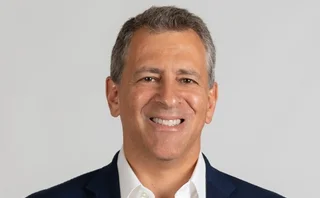
Technology advisory of the year: Accenture
Energy Risk Awards 2019: Consultancy harnesses technology to improve decision-making at the heart of its clients’ businesses

The trading and commercial practice at Accenture, winner of this year’s Energy Risk technology advisory of the year award, is undergoing an evolution: from implementing end-to-end services and technology solutions to growing client relationships that go to the core of how they do business.
“Historically, consulting work in the commodities space was more focused on CTRM [commodity trading and risk management] and improvements to the trade lifecycle,” says David Kayserman, a managing director of trading and commercial at Accenture in Boston. “However, CTRM is not a core competency for our clients; it’s incredibly important, but it’s not something that typically drives competitive advantage,” he says.
“The problems we now spend more time solving are those at the core of our clients’ business, or which present the greatest opportunities for growth, whether it’s generating insights to make decisions and how those decisions are made, or how to scale new customer-centric business models. Our clients are naturally much more protective of these capabilities, and bringing innovation to them or piloting new ideas requires a much more collaborative approach,” he says.
“We operate at the heart of our clients’ businesses and our clients are looking to Accenture not as a typical professional services firm, but as an innovation partner,” he adds.
One element of that collaboration is a commercial or contractual approach that better aligns Accenture to its clients’ objectives, Kayserman says. It’s about the value and outcomes that the client wants to achieve and tying more of Accenture’s remuneration to the measurement of those outcomes as opposed to simply paying for a set of deliverables or for peoples’ time. “Our clients want more of our skin in the game and so do we.” says Kayserman.
We operate at the heart of our clients’ businesses and our clients are looking to Accenture not as a typical professional services firm, but as an innovation partner
David Kayserman, Accenture
To illustrate how technology is transforming what is possible, Houston-based Baris Ertan, a managing director who leads Accenture’s global trading and commercial practice, cites an electricity trading operation that was acquired from a major energy company by another.
“The acquiring company had no capabilities in this space – no systems, no people and no infrastructure – so we needed to set up a greenfield technology capability and organisation for an existing trading business. We suggested that this was the perfect opportunity to run the business – including their proprietary analytics platform – in the cloud. This is one of the first commodity trading shops to run its trading business predominantly in the cloud,” he says.
“Five years ago, that wouldn’t have been viable; two years ago, few would consider taking the risk; now, we and the client are going to do it inside of nine months, in addition to implementing a CTRM system among other new platforms,” says Kayserman.
“Some of the performance benefits we are starting to see are impressive,” he adds, noting that some forecasts and simulations that had taken hours to run, can now run in minutes, and even seconds. “Many of the operational processes this industry has grown used to exist only because of historic performance or computer limitations,” Kayserman explains.
Accenture is also seeing growing interest in robotic process automation as a means to add value in the commodities trading space. “One of the mega-trends we are seeing in the industry is around intelligent automation and the concept of human plus worker,” Ertan says. “When you take human capabilities and insights and combine those with artificial intelligence (AI) or even basic robotics, the outcome of those two working together is a lot more powerful than either working alone. A lot of the work we do with clients is looking at how to embed those new capabilities into their organisations. That means a lot of our work is people- rather than technology-focused.”
As an example, Ertan says many clients are exploring robotics and automation for end-to-end trade lifecycle processes. A number have automated back-office functions, such as trade confirmations, invoicing and broker reconciliation, while some are exploring automating end-of-day monitoring and remediation, removing error-prone human processes.
“We’re also moving into front-office scheduling areas,” he adds, “for example automating pipeline nominations which, because of the lack of a common standard across different US pipelines, are currently prone to repeated manual interventions. It’s a way to eliminate a number of manual steps schedulers have to take to make data flow back and forth.”
“We are hyper-focused on the opportunities that AI creates in the space,” says Kayserman. “For example, many of our oil and gas clients have a trading business primarily to hedge the risk of their commodity exposure and to create additional optionality across their hydrocarbon value chain. Unfortunately, many of these organisations still operate in silos, leaving a tremendous amount of potential value trapped between them.”
By combining AI, computing power, scalable platforms and new organisational and operating models, Accenture is helping energy sector clients – even the very biggest and most complex – optimise that value chain, he says. “Few consultancies have the breadth and depth to tackle a challenge of this complexity for an oil supermajor.”
Kayserman’s advice to clients is not to get distracted by technology buzzwords or to ask themselves which technologies they should be using. Instead they need to look holistically at the opportunities that technology, changing market dynamics, regulatory change and new consumer behaviour might create for their businesses and how they might seize them, he says.
Only users who have a paid subscription or are part of a corporate subscription are able to print or copy content.
To access these options, along with all other subscription benefits, please contact info@risk.net or view our subscription options here: http://subscriptions.risk.net/subscribe
You are currently unable to print this content. Please contact info@risk.net to find out more.
You are currently unable to copy this content. Please contact info@risk.net to find out more.
Copyright Infopro Digital Limited. All rights reserved.
As outlined in our terms and conditions, https://www.infopro-digital.com/terms-and-conditions/subscriptions/ (point 2.4), printing is limited to a single copy.
If you would like to purchase additional rights please email info@risk.net
Copyright Infopro Digital Limited. All rights reserved.
You may share this content using our article tools. As outlined in our terms and conditions, https://www.infopro-digital.com/terms-and-conditions/subscriptions/ (clause 2.4), an Authorised User may only make one copy of the materials for their own personal use. You must also comply with the restrictions in clause 2.5.
If you would like to purchase additional rights please email info@risk.net
More on Commodities
Energy Risk Asia Awards 2025: The winners
Winning firms showcase the value of prudent risk management amid challenging market conditions
Data and analytics firm of the year: LSEG Data & Analytics
Energy Risk Awards 2025: Firm’s vast datasets and unique analytics deliver actionable insights into energy transition trends
OTC trading platform of the year: AEGIS Markets
Energy Risk Awards 2025: Hedging platform enhances offering to support traders and dealers in unpredictable times
Electricity house of the year: Natixis CIB
Energy Risk Awards 2025: Bank launches raft of innovative deals across entire electricity supply chain
Voluntary carbon markets house of the year: SCB Environmental Markets
Energy Risk Awards 2025: Environmental specialist amplifies its commitment to the VCM
Sustainable fuels house of the year: Anew Climate
Energy Risk awards 2025: Environmental firm guides clients through regulatory flux
Weather house of the year: Parameter Climate
Energy Risk Awards 2025: Advisory firm takes unique approach to scale weather derivatives markets
Hedging advisory firm of the year: AEGIS Hedging
Energy Risk Awards 2025: Advisory firm’s advanced tech offers clients enhanced clarity in volatile times







